Search Images
Browse Content (p. 1173)
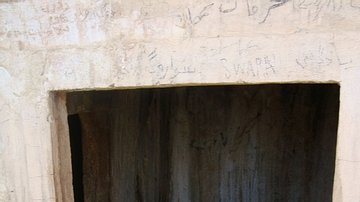
Image
Doorway, Rock-Cut Tombs of Qizqapan
The square doorway at the façade of the rock-cut tombs of Ashkawt-i Qizqapan (Kurdish: The Cave of the Ravisher or the Cave of the Raped/Abducted Girl) leading to the central burial chamber (shown). The square entrance to the central chamber...
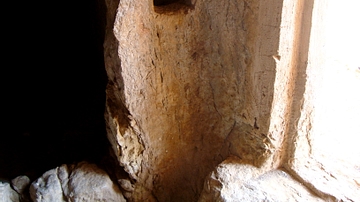
Image
Door Detail, Rock-Cut Tombs of Qizqapan
The doorway and entrance to the rock-cut tombs of Ashkawt-i Qizqapan (Kurdish: The Cave of the Ravisher or the Cave of the Raped/Abducted Girl) lead to a central burial chamber. The latter, through a similar square doorway (left), leads to...
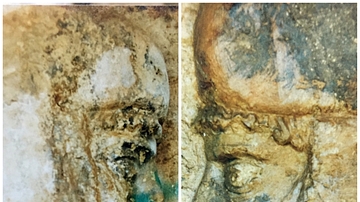
Image
Facial Details, The Rock-Cut Tombs of Qizqapan
A close-up image of the two standing men of the relief at the façade of the rock-cut tombs of Ashkawt-i Qizqapan (Kurdish: The Cave of the Ravisher or the Cave of the Raped/Abducted Girl). The Median headdress (bashlyk) and the piece covering...
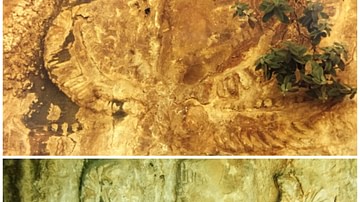
Image
Ahura Mazda, The Rock-Cut Tombs of Qizqapan
Two close-up images of “Ahura Mazda” at the façade of the rock-cut tombs of Ashkawt-i Qizqapan (Kurdish: The Cave of the Ravisher or the Cave of the Raped/Abducted Girl). The upper image dates to June 14, 1999, while the lower one was shot...
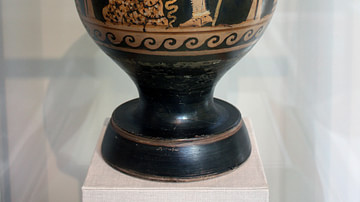
Image
Oedipus & the Theban Sphinx
Bell-Krater (mixing bowl) depicting the Theban Sphinx and Oedipus in the guise of a satyr. Greek, South Italian, Paestan, red-figure, 3rd quarter of the 4th century BCE.
Attributed to Python. (Metropolitan Museum of Art, New York)

Image
Oedipus at Colonus
Painting by Jean-Antoine-Théodore Giroust (1788)
Dallas Museum of Art
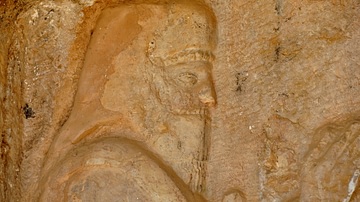
Image
Headdress Detail, Rock-Cut Tombs of Qizqapan
Detail of the relief carved at the façade of the rock-cut tombs of Ashkawt-i Qizqapan (Kurdish: The Cave of the Ravisher or the Cave of the Raped/Abducted Girl). This man stands on the left side. He wears what appears to be a “tiara”; a headdress...

Image
Face Detail, Rock-Cut Tombs of Qizqapan
Detail of the relief carved at the façade of the rock-cut tombs of Ashkawt-i Qizqapan (Kurdish: The Cave of the Ravisher or the Cave of the Raped/Abducted Girl). This man stands on the right side. He wears what appears to be a “tiara”; a...
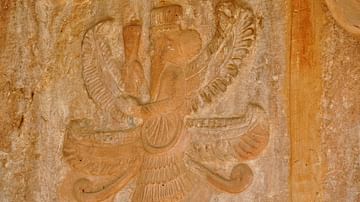
Image
Winged Figure, Rock-Cut Tombs of Qizqapan
Detail of the relief carved at the façade of the rock-cut tombs of Ashkawt-i Qizqapan (Kurdish: The Cave of the Ravisher or the Cave of the Raped/Abducted Girl). This winged figure lies at the left side above the entrance into the main burial...
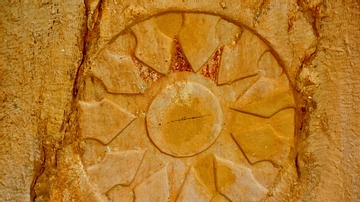
Image
Star Roundel, Rock-Cut Tombs of Qizqapan
Detail of the relief carved at the façade of the rock-cut tombs of Ashkawt-i Qizqapan (Kurdish: The Cave of the Ravisher or the Cave of the Raped/Abducted Girl). This roundel lies at the right side, above the square entrance into the main...